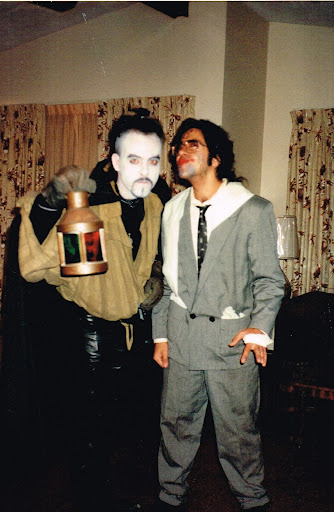Fifteen years ago I lost the friend who had become my older brother and rudder. A vicious cycle of depression destroyed his body, but it failed to kill his soul.
Mood music:
For a lot of my more religious friends, that has to sound odd, if not foul. We’ve been taught that suicide is a mortal sin, the kind that sends the soul straight to hell. I used to believe that. Now I think that line of thinking is wrong, stupid and even a little dangerous. It makes us give up on people who were good to the core, whose only fault was an inability to climb out of the black fog depression smothers the mind with.
Here are a couple brief paragraphs on the day he died:
In the weeks leading up to his suicide, I knew he was badly depressed. I even had a feeling he harbored suicidal thoughts. I just never thought he’d do it. Or it could be that I thought I had more time to be there and help him through it. Instead, I stayed wrapped in my own world as he deteriorated.
On Nov. 15, 1996, he decided he’d had enough. It was a sparkling, autumn Friday and I was having a great morning at work. But early that afternoon, I got a call at work from my mother. She had driven by Sean’s house and saw police cars and ambulances and all kinds of commotion on the front lawn. I called his sister and she put his wife on the phone. She informed me he was dead. By his own hand.
I hated him for years after that, failing to comprehend why he would leave us that way, especially since he knew suicide meant a damned soul. That’s what we were taught.
But I’ve had my own battles with OCD-fueled depression over the years, and despite all the pain that goes with it, I’ve gained wisdom. I understand now what happens to a mind on the ropes.
I know now that when you’re in the grip of an out-of-control mental illness, you lose all sense of right and wrong. I think you enter a sort of dementia. Not in every case, but a lot of cases. You lose the ability to make reasonable decisions.
In that state of being, I don’t think a person can be held responsible for the damage they inflict on themselves, because they are not acting with a fully-functioning brain. I could put it another way and say a person in that state is no longer dealing with a full deck, but you should get the point by now.
My friend Linda, herself a person of strong Catholic Faith, recently sent me a passage from the Catechism of the Catholic Church that shows that suicide isn’t the trip to eternal damnation many in the church would have us believe:
“2282 Grave psychological disturbances, anguish, or grave fear of hardship, suffering, or torture can diminish the responsibility of the one committing suicide.
2283 We should not despair of the eternal salvation of persons who have taken their own lives. By ways known to him alone, God can provide the opportunity for salutary repentance. The Church prays for persons who have taken their own lives.”
Nothing is as black and white as we’d like to believe.
Now that I have the peace of knowing that Sean Marley’s soul didn’t die on that confused morning, I’m able to focus on what he did for me.
–He filled the role of older sibling when my own older brother could no longer do so.
–He taught me that it’s OK to question the status quo at all times, to never take things at face value.
–He taught me that it’s OK to be different, and that being different is even something to celebrate.
–He taught me that the world is bigger than the neighborhood you grow up in, and that you need to see something of the world to understand it.
–He taught me to be a fighter.
And now for some of the cool things you may not have known about him:
–He was a gifted guitarist. He could learn to play just about anything, and could write great musical bits when he wanted to. He gave me my first guitar for Christmas in 1986. It was an Ibanez strat model. He had what I think was a Guild electric guitar with a dark blue or black body. I sold the Ibanez several years later and it’s one of my biggest regrets. Sean was pissed but forgave me. I sometimes wonder whatever happened to his guitar. I hope someone’s putting it to good use.
–He was a great writer, and was a very disciplined diary keeper. He showed me several entries over the years, but I haven’t read them since his death. I know they are in safe hands, though.
–His hair went through more changes than Hillary Clinton’s, in both style and color.
–He reveled in listening to bands that weren’t as well known. He was listening to Kix several years before they achieved moderate success. He turned me on to T-Rex, Thin Lizzy and Riot (not Quiet Riot. This band was just called Riot).
–He loved the sea as much as I did, which makes sense, since his father Al was the one who really taught me to appreciate the ocean.
–He was a vegetarian who could not understand why people had to kill animals for food or any other reason. I never caught on, but I respected him for it.
–He was a very spiritual man who was always seeking. He eventually rebelled against the Catholic faith he was brought up on, but he was always reading, writing and exploring who exactly his higher power was.
–He used to find a lot of bizarre z-grade horror movies for us to watch. I can’t remember half the titles, though the Toxic Avenger was in there somewhere. One movie involved aliens who drank their own vomit. He thought that was especially funny.
–He was a Libertarian way before it was the popular thing to be. In fact, in the 1988 presidential election we both voted for a practically unknown politician named Ron Paul. He was the libertarian candidate. Sean voted for him because he was a true believer. I just didn’t want to vote for Bush or Dukakis.
–He was always taking classes, studying and studying some more. He had a serious, deep academic mind. He never stopped learning.
Thanks to him, I’ve never stopped learning. Though he probably didn’t intend it, he also taught me lessons about dealing with suicide. That may seem absurd, but if not for his death, I never would have embarked on the journey to understand.
For those dealing with a suicide in the family, I have a few things for you to consider. I’ve written this down in a few other posts, but it bears frequent repeating. Read it and then get on with your life:
–Blaming yourself is pointless. No matter how many times you replay events in your mind, the fact is that it’s not your fault. For one thing, it’s impossible to get into the head of someone who is contemplating suicide. Sure, there are signs, but since we all get the blues sometimes, it’s very easy to dismiss the signs as something close to normal. When someone is loud in contemplating suicide, it’s usually a cry for help. When the depressed says nothing and even appears OK, it’s usually because they’ve made their decision and are in the quiet, planning stages.
–Blaming each other is even more pointless. Take it from me: Nerves in your circle of family and friends are so raw right now that it won’t take much for relationships to snap into pieces. A week after my friend’s death I wrote a column about it, revealing what in hindsight was too much detail. His family was furious and most of them haven’t talked to me since. They feel I was exploiting his death to advance my writing career and get attention. What I’ve learned, and this is tough to admit, is that you’re going to have to let it go when the finger pointing starts. It’s better not to engage the other side. Nobody is in their right mind at this point, so go easy on each other. Give people space to make their errors in judgment and learn from it.
–Don’t demonize the dead. When a friend takes their life, one of the things that gnaws at the survivors is the notion that — if there is a Heaven and Hell — those who kill themselves are doomed to the latter. I’m a devout Catholic, so you can bet your ass this one has gone through my mind. What I’ve learned though, through my own experiences in the years since, is that depression is a clinical disease. When you are mentally ill, your brain isn’t firing on all thrusters. You engage in self-destructive behavior even though you understand the consequences. A person thinking about suicide is not operating on a sane, normally-functioning mind. So to demonize someone for taking their own life is pointless. To demonize the person, you have to assume they were in their right mind at the time of the act. And you know they weren’t. My practice today is to simply pray for those people, that their souls will still be redeemed and they will know peace. It’s really the best you can do.
– Break the stigma. One of the friends left behind in this latest tragedy has already done something that honors her friend’s life: She went on Facebook and directed people toward the American Association of Suicidology website, specifically the page on knowing the warning signs. That’s a great example of doing something to honor your friend’s memory instead of sitting around second guessing yourself. The best thing to do now is educate people on the disease so that sufferers can help themselves and friends and family can really be of service.
–On with your own life. Nobody will blame you for not being yourself for awhile. You have, after all, just experienced one of the worst tragedies there is. But try not to let it paralyze you. Life must go on. You have to get on with your work and be there for those around you.
Life can be a brutal thing. But it IS a beautiful thing.
Seize it.








